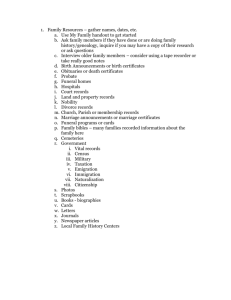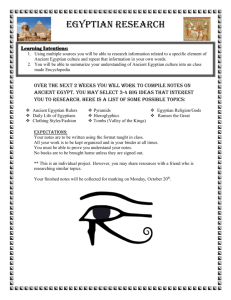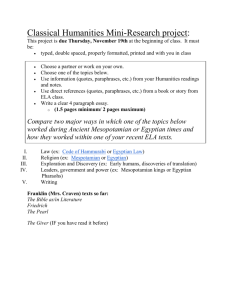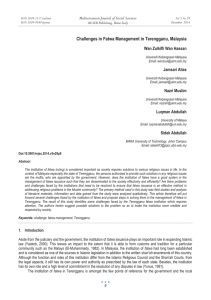Tantawi on Banking Operations in Egypt
advertisement
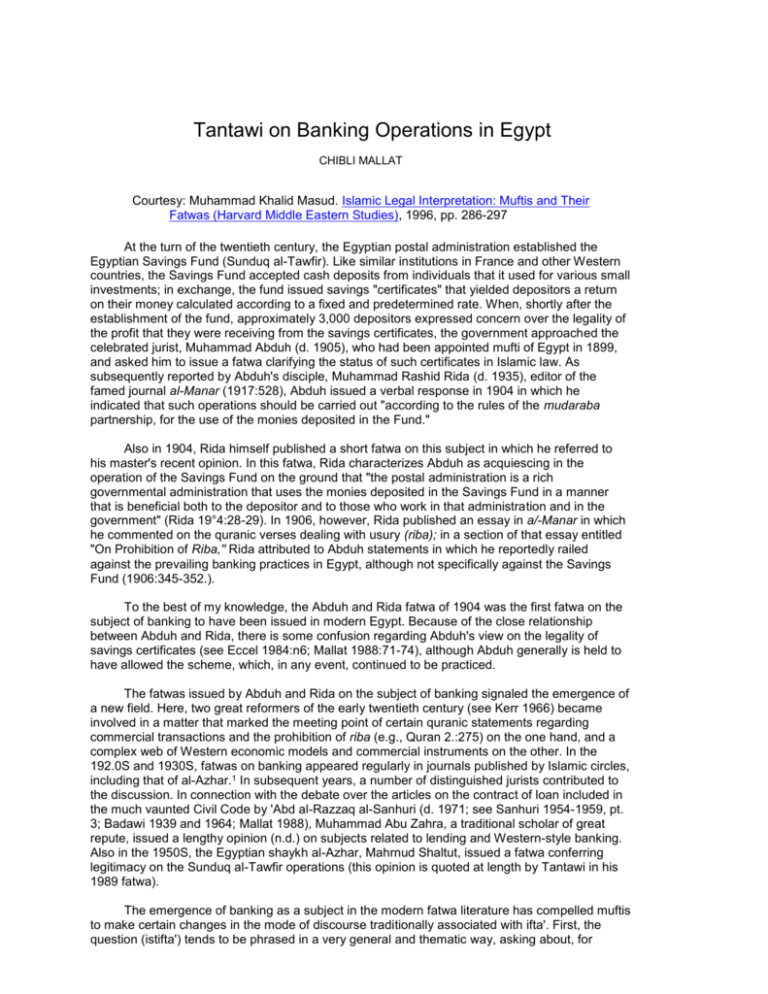
Tantawi on Banking Operations in Egypt
CHIBLI MALLAT
Courtesy: Muhammad Khalid Masud. Islamic Legal Interpretation: Muftis and Their
Fatwas (Harvard Middle Eastern Studies), 1996, pp. 286-297
At the turn of the twentieth century, the Egyptian postal administration established the
Egyptian Savings Fund (Sunduq al-Tawfir). Like similar institutions in France and other Western
countries, the Savings Fund accepted cash deposits from individuals that it used for various small
investments; in exchange, the fund issued savings "certificates" that yielded depositors a return
on their money calculated according to a fixed and predetermined rate. When, shortly after the
establishment of the fund, approximately 3,000 depositors expressed concern over the legality of
the profit that they were receiving from the savings certificates, the government approached the
celebrated jurist, Muhammad Abduh (d. 1905), who had been appointed mufti of Egypt in 1899,
and asked him to issue a fatwa clarifying the status of such certificates in Islamic law. As
subsequently reported by Abduh's disciple, Muhammad Rashid Rida (d. 1935), editor of the
famed journal al-Manar (1917:528), Abduh issued a verbal response in 1904 in which he
indicated that such operations should be carried out "according to the rules of the mudaraba
partnership, for the use of the monies deposited in the Fund."
Also in 1904, Rida himself published a short fatwa on this subject in which he referred to
his master's recent opinion. In this fatwa, Rida characterizes Abduh as acquiescing in the
operation of the Savings Fund on the ground that "the postal administration is a rich
governmental administration that uses the monies deposited in the Savings Fund in a manner
that is beneficial both to the depositor and to those who work in that administration and in the
government" (Rida 19°4:28-29). In 1906, however, Rida published an essay in a/-Manar in which
he commented on the quranic verses dealing with usury (riba); in a section of that essay entitled
"On Prohibition of Riba," Rida attributed to Abduh statements in which he reportedly railed
against the prevailing banking practices in Egypt, although not specifically against the Savings
Fund (1906:345-352.).
To the best of my knowledge, the Abduh and Rida fatwa of 1904 was the first fatwa on the
subject of banking to have been issued in modern Egypt. Because of the close relationship
between Abduh and Rida, there is some confusion regarding Abduh's view on the legality of
savings certificates (see Eccel 1984:n6; Mallat 1988:71-74), although Abduh generally is held to
have allowed the scheme, which, in any event, continued to be practiced.
The fatwas issued by Abduh and Rida on the subject of banking signaled the emergence of
a new field. Here, two great reformers of the early twentieth century (see Kerr 1966) became
involved in a matter that marked the meeting point of certain quranic statements regarding
commercial transactions and the prohibition of riba (e.g., Quran 2.:275) on the one hand, and a
complex web of Western economic models and commercial instruments on the other. In the
192.0S and 1930S, fatwas on banking appeared regularly in journals published by Islamic circles,
including that of al-Azhar.1 In subsequent years, a number of distinguished jurists contributed to
the discussion. In connection with the debate over the articles on the contract of loan included in
the much vaunted Civil Code by 'Abd al-Razzaq al-Sanhuri (d. 1971; see Sanhuri 1954-1959, pt.
3; Badawi 1939 and 1964; Mallat 1988), Muhammad Abu Zahra, a traditional scholar of great
repute, issued a lengthy opinion (n.d.) on subjects related to lending and Western-style banking.
Also in the 1950S, the Egyptian shaykh al-Azhar, Mahrnud Shaltut, issued a fatwa conferring
legitimacy on the Sunduq al-Tawfir operations (this opinion is quoted at length by Tantawi in his
1989 fatwa).
The emergence of banking as a subject in the modern fatwa literature has compelled muftis
to make certain changes in the mode of discourse traditionally associated with ifta'. First, the
question (istifta') tends to be phrased in a very general and thematic way, asking about, for
example, the validity of Western-style banking, or the influence of riba on modern commercial
transactions. Second, the complex nature of financial transactions makes it difficult to deal with
the subject in a simple and definitive manner. Although some muftis (e.g., Abduh-Rida in 1904
and 1917) managed to respond in just a few lines, others have written full-length treatises. The
longest fatwa on the subject is perhaps that of Muhammad Baqir al-Sadr, issued in 1969 in
response to a query emanating from the Kuwaiti Ministry of Awqaf (Mallat 1993, Chapter 5).
In this chapter, I propose to examine a fatwa issued by the current mufti of the Egyptian
Republic, Muhammad Sayyed Atiyya Tantawi.2 As the head of Dar al-ifta', the grand mufti
presides over a large and complex bureaucracy in which the practice of fatwa giving has taken on
a greater collective and consensual character than it possessed in pre-modern times. The mufti
of the Egyptian territories (mufti al-diyar al-misriya) is the font of ifta' in Egypt, and he commands
greater respect than any other mufti in the country. Indeed, the grand mufti of Egypt is arguably
the most prestigious mufti in the entire Sunni Muslim world. On September 6, 1989, Tantawi
issued a fatwa entitled "On Some Banking Operations." Approximately twelve pages long in its
printed edition and containing no reference to a specific question, the general form and style of
this text place it squarely within the modern tradition of fatwa giving on the subject of banking,
replete with citations from both classical and modern jurists. In one important respect, however,
Tantawi's fatwa signals a significant break with the earlier tradition of ifta'. At a critical juncture in
his response, the mufti assumes the role of mustafti by addressing a question to a lay expert, in
this instance, a bank manager. Tantawi includes in his fatwa both his question to the bank
manager and the latter's response. Although the authority of the response resides ultimately with
the mufti himself, the act of seeking clarification from a lay person with no training in Islamic law
is noteworthy and may signal a new and different type of ifta'.
Born on October 28, 1925, Muhammad Sayyed Atiyya Tantawi was educated in traditional
Islamic circles. He studied theology (usul al-din) at al-Azhar, where he earned a doctorate in
quranic commentary and hadith. In the late 1960s he taught briefly at al-Azhar. He then taught for
several years in Asyut before returning to al-Azhar, where he became the dean of the theology
faculty. Tantawi has written several scholarly treatises, most notably a fifteen-volume
commentary on the Quran. In 1986, he was appointed mufti of the Arab Republic of Egypt,
although he continued to perform various administrative roles at al-Azhar. Frequently in the public
eye, Tantawi appears regularly on religious programs broadcast on television and is also seen
seated next to the president on official occasions. As behooves a chief mufti of the republic,
Tantawi often takes public stances on sensitive political issues. During the Gulf War, for example,
he issued a fatwa in which he declared Iraq's occupation of Kuwait to be illegal and conferred
legitimacy on armed opposition to the Iraqi invaders (Tantawi 1990; see Chapter 27 in this
volume).
The 1990 version of Tantawi's fatwa on banking (Khudayri 1990:353364) is divided into
fourteen sections of varying lengths. In it, the mufti addresses both the general field of banking
transactions and the legality of profits deriving from specific transactions. Most important, the
fatwa legitimizes "capitalization certificates" (shahadat al-istithmar), that is, government bonds
underwritten by Egyptian banks. The fatwa was issued at a time when the validity of Westernstyle banking was being called into question in militant Islamic circles, and when new, Islamic
financial institutions were being created in large numbers. It should be noted that Tantawi's fatwa
was issued immediately prior to the scandal associated with the Islamic financial institution known
as al-Rayyan, which squandered millions of pounds entrusted to it by Egyptian citizens. Because
the government unofficially supported the traditional banks, the issuance of the fatwa took place
in a highly charged political atmosphere. As the senior religious official in the Egyptian
government, Tantawi must have been aware, as he composed his fatwa, of the political and
financial challenges to the state represented by the Islamic financial institutions.
In the opening passage, the mufti discusses the crucial role of ifta' and the necessity for
Dar al-ifta' to perform this role:
There is much talk nowadays about banking transactions (mu'amalat], about the
consequences of these transactions on profits, and about whether or not these transactions
and profits are legal. Dar al-ifta' of Egypt has therefore found it necessary to clarify its
position on some of these transactions, after the invasion of the field by those who know
and those who don't know. (p. 353)
Four sections follow in which the mufti establishes, on the basis of the Quran and hadith,
the obligation of wise men (literally: those who are rational, al-'uqala') to search for the truth, the
principle of ijtihad, the virtue of avoiding fanaticism (al-ta'assub), and the importance of expertise
in unraveling arcane subjects (pp. 353-354).
After citing Quran 21:7 ("ask the ahl al-dhikr if you do not know"), he defines the ahl al-dhikr
as "the people of expertise and experience in all science and art." Glossing this definition, he
adds, "in medicine you ask physicians, in fiqh the fuqaha', and in economics you ask economists"
(p. 354). The emphasis on expertise is supported by a prophetic hadith that is put to double use,
serving, first, to reinforce the importance of expertise in the Islamic tradition and, second, to
introduce the specific consequences of this expertise with relation to Dar al-ifta'. Tantawi
continues: "Dar al-ifta' of Egypt is responsible before God for issuing all [necessary] fatwas and
rules. Thank God, Dar al-ifta' can accommodate both those who agree and those who disagree,
but it cannot withhold science ['ilm] which God has ordered it to pursue." Accordingly, it is the
obligation of Dar al-ifta' "to answer those who ask questions." He continues, "The duty of the
mufti is to reveal the legal rule . . . It is not part of his duty to impose it in all circumstances" (p.
354).
In section five, the mufti refers to the complexity of banking operations:
Dar al-ifta' believes that it is not possible to talk about banking transactions in one single
sentence, as, for example, by saying that banking transactions are all permitted or all
forbidden. Each question must be addressed separately, or, at least, similar questions
should be consolidated, after which, the required legal rule may be issued. (p. 355)
Reaching the heart of his subject, Tantawi places all banking transactions in three
categories:
(1) transactions that all 'ulama' agree are legal and in which profits are halal;
(2) transactions that the 'ulama' agree are not legal and in which profits are haram; and
(3) transactions and profits about which the 'ulama' are in disagreement.
In section six of his fatwa, the mufti adduces the following examples of the first category:
selling and buying, commenda transactions (mudaraba), partnership (musharaka), and lease.
Included in this category, Tantawi continues, are four types of banking operations. The first type
involves transactions "in which profits are subject to increase or decrease, without being
previously determined in time or quantity; [in such transactions,] all parties benefit and all bear
any loss in a manner which is equitable . . . I say: these transactions and profits are halal and
legal. . . This rule is equally applicable . . . to banks which describe themselves as Islamic and to
those which do not." The second type includes the operations of "investment companies"
(sharikat tawzif al-amwal) such as al-Rayyan: "I say: the transactions and profits of these
companies are legal; Dar al-ifta' approves of them and wishes them luck and success."
The mufti here presumes that these companies are operating in accordance with the law,
without specifying what constitutes legality. He does, however, issue a warning with regard to
investment companies that do not behave properly: "As for companies which are proven to have
deviated from the straight path in any way whatsoever, they are not supported at all by Dar alifta', which demands accountability and the meting out of the proper and just penalty." The third
type includes "social banks [bunuk ijtimaiyya] . . . such as Bank Nasir, which offer the needy what
they require in terms of money, taking in return reasonable fees, calculated by just experts
[khubara' 'udul], [which are used] for the salaries of employees and other expenses borne by
these banks . . . I say: these sums which the banks receive to cover salary or administrative
expenses are legal. . . because they are given against specific services which the bank renders
to those who deal with it." Finally, the fourth type includes "specialized banks [bunuk
mutakhassisa] such as industrial, agricultural, or real estate institutions which offer to the
providers of various helpful services the sum they require against adequate compensation, which
is assessed by just experts as salaries or administrative expenses" (pp. 355-357).
In section seven the mufti turns to transactions that are illegal (category 2) "because they
are based on practices that are forbidden [haram], such as any transaction that is based on fraud,
exploitation, deceit, or injustice."
This is the case with "the sale of defective merchandise," with "the sale of merchandise for
twice its value," and with "taking advantage of the ignorance of one of the parties as to the market
price." The mufti offers the following example of such an illegal financial transaction:
A person lends to another 100 pounds for a specified period of time. When the time comes
for repayment, the debtor is unable to pay and the creditor takes advantage of this inability.
In an effort to exploit the borrower's weakness, [the creditor] tells him, "Either you pay what
is due or you pay this sum with an increase of ten pounds in a month," for instance. This is
clear riba [al-riba al-jali] against the perpetrators of which the shari'a of Islam and its
Prophet have caUed for war. (p. 357)
Transactions that fall into category 3, Tantawi continues, pose the greatest difficulty for Dar
al-ifta'. This category, for the most part, includes "transactions that are new and innovative
[mustahdatha]." At this point Tantawi refers specifically to capitalization certificates issued by the
Egyptian Ahli Bank in the amount of 4 billion Egyptian pounds as of April 1989. In a significant
and unusual move, the mufti here concedes that he must seek someone else's opinion before
issuing his own: "Dar al-ifta' understands that scientific trust requires [the mufti] not to issue a
fatwa in such matters before asking those who are knowledgeable and possess expertise in
these matters, because ruling on an issue requires [that the mufti] fully understand it." Here, Dar
al-ifta' concedes that it could not immediately answer questions that fall beyond its area of
expertise-in the present instance, in the arcane field of banking. To better understand the issues,
Tantawi explains, he himself sent a detailed letter containing four questions to the chairman of
the board of the Egyptian Ahli Bank. To these questions, Tantawi informs us, the chairman of the
board responded as follows on August 13, 1988:
Question I: What is the nature of capitalization certificates and what is the motive
creation?
for their
Answer I: Capitalization certificates represent one type of saving, with the creation of which
the government entrusted the Egyptian Ahli Bank, as a contribution to the [social] sense of
saving [al-wa'i al-iddikhari] and in order to finance the development plan; that is, the real
relationship is betWeen the state and the individual. The certificates were issued according
to Law 8, 1965.
Question 2: In what ways is the return on capitalization certificates used?
Answer 2: The return is used to finance development projects that are included in the
budget, and they are paid to the Ministry of Finance; that is, the return is given to the
state for the financing of the development plan.
Question 3: Who pays the profits which capitalization certificates bring to their owners?
Answer 3: The Ministry of Finance finances the profits which capitalization certificates earn, in
addition to [financing] all related expenses.
Question 4: Are capitalization certificates to be considered a loan or do they constitute a deposit
which their owner is allowed to put to use?
Answer 4: A capitalization certificate is a deposit the value of which the owner is allowed to put to
use. (p. 358)
After citing the bank chairman's responses, the mufti summarizes the views of Muslim jurists on the
subject of capitalization certificates. In 1976, he explains, a committee of fourteen jurists belonging to the
four schools of law, under the 'chairmanship of Shaykh Muhammad Faraj al-Sanhuri, conducted a debate
on the subject of capitalization certificates. Muhammad Jirat Allah, a Shafi'i jurist, argued that although
this transaction resembles a mudaraba, it is vitiated by the predetermined return on the deposit.
Concurring with this view were Tantawi Mustafa, Jad al-Rabb Ramadan (also a Shafi'i), and the Maliki
jurist Sulayman Ramadan (p. 359).
The remaining nine scholars considered these certificates and their profits to be legal. According to
the Maliki jurist Yas Suwaylem, a transaction in which individuals provide capital that the state puts to use
is nowhere mentioned in classical law books. Thus, because all transactions are in principle allowed
unless expressly forbidden, and because this particular transaction benefits both the individual and the
state, the certificate is licit in its three forms-referring to three types of certificates issued by the bank, as
indicated by their denomination: a (alif), b (bit), and c (jim). The Hanbali jurist Shaykh Abd al-Azim Baraka
viewed the first two types of certificates as legal because they are similar "to the mu#raba transaction in
which the return on money is shared by the provider of capital and the worker." One cannot contend that
the return, being predetermined, is illegal, because, he continued, "the matter is different here, since the
projects [in which the money is invested] are based on economic projections in which results are
guaranteed. The amount that the provider of capital derives from the profits is small in comparison with
the overall profits that the projects generate. Both parties benefit, and exploitation and bereavement are
avoided" (pp. 360-361). The assessment of the third type (denomination c), which includes a bonus
based on a lottery, is more straightforward. According to Baraka, this bonus represents a gift from the
state to the investor who holds the certificate, and therefore is legal.
The legitimacy of capitalization certificates also was confirmed by the Hanafi scholar Muhammad
Salam Madkur, who, reasoning in a manner similar to Suwaylem, concluded that "the profits given by the
bank are not ribii, because there is no exploitation and no risk of loss" (p. 361).
These views, Tantawi continues, corroborate the fatwa previously issued by Shaltut (n.d.) with
regard to the Egyptian Savings Fund. Tantawi cites the following passage from Shaltut's fatwa:
By applying legal rules and fiqh principles, we see that the profits [arbah] of the Savings Fund
[sunduq al-tawfir] are legal. Such transactions are not prohibited, because money which is
deposited is not a debt of the bank to its owner, nor a loan contracted by the bank. Rather, the
owner presented it of his own free will to the postal administration [which managed the Savings
Fund], asking the bank to accept it, with the knowledge that the administration puts the deposited
moneys to use in commercial transactions in which it is rare, perhaps even impossible, for these
moneys to be wasted or lost. (p. 361)
Mutatis mutandis, and on the authority of Shaltut, Tantawi compares the profits deriving from the
capitalization certificates to the profits of the Savings Fund (p. 361).
In section thirteen Tantawi begins his conclusion, citing a statement of the bank chairman
according to which the certificate is issued in connection with the state's financing of the development
plan, to encourage the population to increase its level of savings. Legally, the certificate is not a loan but
a deposit. Against the argument of those who oppose the legality of the certificate on the ground of
predetermined profit, Tantawi cites jurists who argue "that the determination of the profit in advance is for
the sake of the owner of the capital [that is deposited] and is done to prevent a dispute between him and
the bank." The mufti cites Abd al-Wahhab al-Khallaf to the same effect: "Mudaraba [used to be] carried
out in accordance with an agreement between the partners. We currently live in a time in which the wills
of people are weak. Thus, if the owner of capital did not receive a fixed share in the profit, he would be
swallowed by his partner." To this point Tantawi adds that the share in the profit has varied from 4 to 16
percent and is not fixed. "Thus, in case of loss, there is no doubt that all [depositors] carry their share of
the loss" (p. 362).
The mufti concludes the fatwa by restating the question and summarizing his own view:
What is the opinion of Dar al-ifta' on the question of capitalization certificates and the profits
deriving from them?
The answer is that Dar al-ifta' has suggested to the directors of the Ahli Bank that they undertake
the necessary measures to rename the profits given to the holders of capitalization certificates by
calling [those profits] a capitalization return ['a'id istithmariJ or a capitalization profit [ribh istithmari.
[Dar al-ifta' has furthersuggested] that [the directors] delete the word interest [fa'ida] because of its
connection in people's minds with riba, even if the rule is that transactions are judged by their truth
and content, not by their name and appellation.
The bank directors also should establish a fourth certificate which they should call the certificate
with a variable or non-fixed return, in which a precise profit is not determined in advance, but rather
profits may increase or decrease.
In this manner, [the directors] wilI open the door to all transactions and put minds to rest. The
people approached with these suggestions have shown their satisfaction with them and promised
that they will be implemented very soon.
On this basis, the Egyptian Dar al-ifta' considers the transactions involving capitalization certificates
and those [commercial instruments] that resemble them in the savings houses to be legal, and [it
considers] the profits deriving from them to be ha/al and legal. This is because they are either a
legal mudaraba, as in the opinion of Shaykh Abd al-Azim Baraka and others, or because they are a
novel [and innovative] transaction that helps individuals and the Muslim community [umma], and
that entails no exploitation of either party, as in the opinion of Dr: Muhammad Salam Madkur and
others.
It is beneficial that the individual buys these certificates to help the state develop worthwhile
projects for all. [It also is beneficial that the individual] receives what the state gives him in return,
as an encouragement for his support in a manner that benefits him and others. (p. 363)
The Mufti ends the fatwa by reiterating his reliance on both legal and I economic experts and
promising similar exercises on "other aspects of banking transactions, which are, as mentioned
previously, varied in their ways and means" (p. 364).6 That the fatwa was and continues to be controversial is reflected in its having recently been characterized by the Federal Shari'at Court of Pakistan
as the "solitary opinion of Shaykh Tantawi of Egypt" (1992.:20).
Tantawi's fatwa legitimizing capitalization certificates adds a link to the complex chain of efforts by
muftis and 'ulama' to intervene in Egyptian commerce during the course of the twentieth century. The
characteristics of this chain may be summarized as follows: Egyptian muftis writing in the twentieth
century acknowledge that they are treading a delicate path and are dealing with powerful economic actors
and institutions that have strong supporters in new, as well as in established, commercial sectors.
Because a fatwa that unilaterally condemned interest-bearing transactions would be totally ineffective,
most muftis have taken care to formulate their opinions in language that is either cautious or ambiguous.
The ambiguously worded fatwas issued in the early part of the century established a pattern that was
followed by later muftis, with only a few exceptions (e.g., Shaltut).
The muftis of twentieth-century Egypt cannot escape the authority of their public office. Whatever
religious authority he may possess, the mufti is first and foremost a public servant. Although his public
function does not prevent him from occasionally voicing a discordant note, he remains a subaltern to
official power. In the particular context in which Tantawi's fatwa on banking was issued, the mufti is also
subordinate to the Egyptian judiciary, as demonstrated by another famous intervention that is directly
related to the issue of banking and interest. In 1985, a case arose before the Supreme Constitutional
Court of Egypt over the constitutionality of Article 2.2.6 of the Egyptian Civil Code. This article, which
allows a fixed interest to be paid in case of default by the debtor, was attacked as unconstitutional by the
rector of al-Azhar on the basis of Article 2 of the Constitution, which subjects all legislation to the
principles of the shari'a. The judges adopted the view that a retrospective invalidation of a statute could
not be contemplated by the Supreme Constitutional Court (SCC, May 4, 1985, and November 16, 1985).
This principle was consistently applied in the protection of civil code legislation, notably Article 227, which
stipulates: "The contracting parties can agree on a different rate of interest, whether in return for a delay
in payment [this is related to Article 2.2.6] or in any other situation [which includes a loan for interest], on
the condition that this rate does not exceed 7 percent. If they agree on a higher interest rate, this rate will
be reduced to 7 percent, and any surplus already paid must be returned [to the borrower]." This article
clearly regulates fixed interest on loans, about which there was considerable controversy. The Supreme
Constitutional Court also had an occasion to reaffirm its unwillingness to reconsider legislation that had
been passed prior to the amendment of the Constitution in 1980 (SCC, December 21, 1985). Thus, it
clearly was asserting its superior status in expounding the application of Islamic law in Egypt (see also
SCC, May 16, 1991, dealing with Islamic law and property).
The position of the Supreme Constitutional Court demonstrates that the mufti and Dar al-ifta'
continue to playa secondary role in the determination of whether Islamic law is respected in the
contemporary Egyptian legal system. Although the opinion of a mufti carries significant emotional and
"sociological" weight, it remains legally ineffective and subordinate to the court, even in matters relating to
the interpretation of the role played by Islamic law in the state. At the same time the ideological position of
Dar al-ifta' remains powerful in Egypt. The issues are important and answers are eagerly awaited.
In the present instance, Tantawi was conscious of his own intellectual limitations in the field,
acknowledging that, irrespective of his competence in the shari'a, a mufti trained at al-Azhar has very little
knowledge of the banking world and that the alien vocabulary associated with modem banking quickly
transforms an imprudent mufti into a "fish out of water." What is significant, indeed remarkable, about
Tantawi's fatwa is his candid acknowledgment of this weakness. Also significant is the manner in which
he explains the method by which he researched the subject of banking and inserts into the fatwa lengthy
quotations from secular "specialists." This example suggests that the mufti in late twentieth-century Egypt
recognizes the limitations of religious knowledge ('i/m) in the modem world and acknowledges the
necessity of appealing to authorities trained in secular institutions.
Mufti Tantawi continues to issue fatwas on financial transactions that are published in daily
newspapers (see, for example, a series of five fatwas on financial transactions that appeared in a/-Ahram
in May 1991). Although the pressure to Islamize Egyptian banks may have decreased following the
scandalous collapse in 1990 of the financial institution al-Rayyan, the mufti, despite his self-professed
limitations, surely will continue to play an important role in Egyptian society. The modest tone of a
religious expert who himself seeks the advice of experts in other fields can only strengthen the moral
authority of the mufti, both in Egypt and in the Sunni Muslim world at large.
Home
Study Resource Page
Index of My Writings
Have you visited my other sites?
Kazi Nazrul Islam?
Genocide/Bangladesh/1971?
Hadith Humor?
Economics-Finance?



